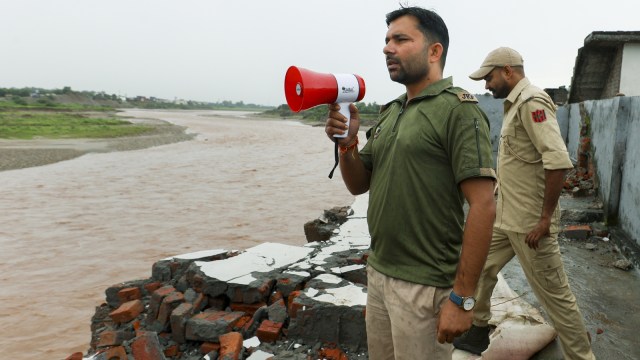India has alerted Pakistan about “high flood” in Tawi river on “humanitarian grounds”, even as the Indus Water Treaty (IWT) continues to remain in abeyance, The Indian Express has learnt.
“A decision was taken to share information regarding high flood on humanitarian grounds. The Indus Water Treaty is in abeyance so the information was shared through the Ministry of External Affairs (MEA),” said a source.

As per sources, the Ministry of Jal Shakti on Sunday shared flood-related information with the MEA, which communicated it to Islamabad through diplomatic channels.
Under the IWT, flood data used to be shared through Indus Water Commissioners. India suspended the Treaty in April this year following the April 22 Pahalgam terror attack in which 26 people were killed and another 10 injured.
“Indus Water Treaty of 1960 will be held in abeyance with immediate effect until Pakistan credibly and irrevocably abjures its support for cross border terrorism,” said Foreign Secretary Vikram Misri, addressing a special briefing on April 23.
Countries not having a treaty also share flood-related information with each other. For instance, India and China share early flood warnings along the Brahmaputra even though they do not have a water treaty.
Jammu has been witnessing heavy rainfall this monsoon, with Tawi now flowing close to 12 feet – only five below the danger mark of 17. Heavy rain has killed close to 800 people in Jammu this year, including 65 killed in flash floods during the Machail yatra in Kishtwar.
Story continues below this ad
 Under the Indus Water Treaty, the flood data was shared through the Indus Water Commissioners. (PTI)
Under the Indus Water Treaty, the flood data was shared through the Indus Water Commissioners. (PTI)
Eastern & Western Rivers
The IWT was signed on September 19, 1960 after nine years of negotiations between India and Pakistan. The Treaty has 12 Articles and 8 Annexures (from A to H). As per the provisions of the Treaty, all the water of “Eastern Rivers”— Sutlej, Beas and Ravi — shall be available for the “unrestricted use” of India. However, Pakistan shall receive water from “Western Rivers”—Indus, Jhelum and Chenab.
The suspension of the IWT gave India an option to stop sharing of water flow data with Pakistan. It also undertook reservoir flushing exercises to remove accumulated sediment by releasing water through low-level outlets. Earlier, India was not allowed to do reservoir flushing exercises under the IWT.
ExplainedNo regular river data sharing
By sharing high flood information with Pakistan, India has followed the humanitarian approach. However, the regular river water flow data sharing will not resume till the Indus Water Treaty is kept in abeyance.
In January 2023, India had issued a notice to Pakistan seeking a “modification” of the IWT. Delhi is constructing two hydel power projects — Kishenganga HEP on Kishenganga river, a tributary of Jhelum, and Ratle HEP on the Chenab. In 2015, Pakistan objected to their design features and moved the World Bank, seeking a settlement through a neutral expert, but withdrew its request a year later and asked for adjudication through a Court of Arbitration instead. India, for its part, moved an application for a neutral expert to rule on the differences.
Story continues below this ad
On October 13, 2022, the World Bank appointed Michal Lino as the neutral expert. The same day, it also appointed a Court of Arbitration. India opposed it, saying it could not be “compelled to recognise illegal and parallel proceedings not envisaged by the Treaty” and boycotted the court hearings. It, however, continued participating in the “Treaty-consistent Neutral Expert proceedings”.
On August 14, India rejected the award of the “so-called Court of Arbitration” on issues of general interpretation of the IWT.



 Under the Indus Water Treaty, the flood data was shared through the Indus Water Commissioners. (PTI)
Under the Indus Water Treaty, the flood data was shared through the Indus Water Commissioners. (PTI)





